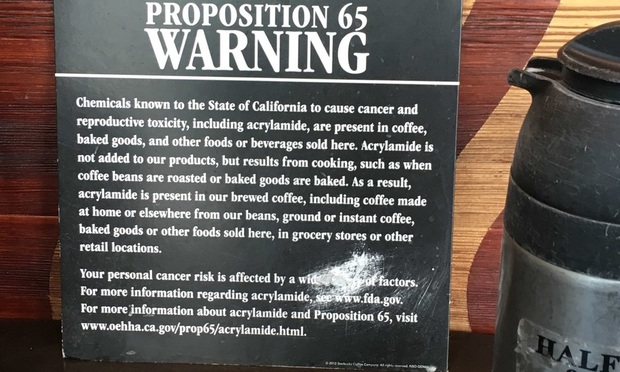Sugar, Cream and a Prop 65 Warning Label With Your Coffee?
Prop 65 is a regular target of business groups who say its private-right-of-action provisions and far-ranging scope leads retailers and manufacturers to post so many warning signs that consumers have come to ignore them.
March 30, 2018 at 06:20 PM
4 minute read
 Prop 65 sign at a Starbucks in Sacramento. Credit: Cheryl Miller/ The Recorder
Prop 65 sign at a Starbucks in Sacramento. Credit: Cheryl Miller/ The Recorder Attorneys for Starbucks Corp. and other coffee sellers have less than two weeks to persuade a Los Angeles County judge to reconsider a proposed ruling that could force them to post cancer warnings in stores and on packages.
Superior Court Judge Elihu Berle, in a tentative decision issued Wednesday after a trial, said Starbucks and dozens of other defendants had failed to prove that the level of acrylamide in their coffee poses no significant health risk.
“Defendants did not offer substantial evidence to quantify any minimum amount of acrylamide in coffee that might be necessary to reduce microbiological contamination or render coffee palatable,” Berle wrote in his proposed statement of decision. He said the proffered evidence that coffee has some health benefit “was not persuasive and was refuted by plaintiffs' evidence.”
Acrylamide, which occurs naturally in the bean-roasting process, is listed as a potential reproductive and cancer risk under California's Proposition 65. The 31-year-old voter-approved law requires businesses to warn consumers when they are exposed to one of approximately 900 state-listed chemicals. Those that don't comply can be sued and face civil penalties of up to $2,500 per day, per violation.
The National Coffee Association said industry members are considering their options, including “potential appeals.” Warning labels on coffee would be misleading, the statement said.
“Coffee has been shown, over and over again, to be a healthy beverage,” association president and CEO William Murray said in a statement. “This lawsuit has made a mockery of Prop 65, has confused consumers, and does nothing to improve public health.”
Raphael Metzger, the attorney for plaintiff Center for Education and Research on Toxics, or CERT, noted in an email message that Berle's decision is not yet final.
“Generally, manufacturers need to … put the warnings on packages (bags/cans) of coffee,” Metzger said. “Retailers need to post point-of-display warnings.”
CERT will ask a judge to determine civil penalties, if the decision becomes final, he said.
Joshua Bloom, a partner at Meyers Nave Riback Silver & Wilson in Oakland, said the case and its ultimate disposition are significant both in the scope of the number of businesses and coffee drinkers that could be affected and the potential for shaping Prop 65 enforcement in the area of prepared foods.
“We're not just talking about booster cables or clotheslines or any of a thousand other consumer products,” Bloom said. “First, you're talking about a food product—things that people ingest, where there's understandably a heightened level of scrutiny. And second, it's coffee.”
Many California coffee shops already post Prop 65 warning signs, a move potentially aimed at capping any penalties should the CERT litigation, which started in 2010, succeed, Bloom said.
Prop 65 is a regular target of business groups who say its private-right-of-action provisions and far-ranging scope leads retailers and manufacturers to post so many warning signs that consumers have come to ignore them.
James Colopy, an environmental litigation partner at Farella Braun + Martel, said the decision points to flaws in Prop 65 because “science does not support” a hazardous “level of connection between acrylamide and cancer or reproductive toxicity.”
“The law is very broad and that's the takeaway in this decision,” Colopy said. “This is not judicial overreach. This is a judge enforcing the law on the books.”
This content has been archived. It is available through our partners, LexisNexis® and Bloomberg Law.
To view this content, please continue to their sites.
Not a Lexis Subscriber?
Subscribe Now
Not a Bloomberg Law Subscriber?
Subscribe Now
NOT FOR REPRINT
© 2025 ALM Global, LLC, All Rights Reserved. Request academic re-use from www.copyright.com. All other uses, submit a request to [email protected]. For more information visit Asset & Logo Licensing.
You Might Like
View All
Pistachio Giant Wonderful Files Trademark Suit Against Canadian Maker of Wonderspread
4 minute read
Hogan Lovells, Jenner & Block Challenge Trump EOs Impacting Gender-Affirming Care
3 minute read
Gen AI Legal Contract Startup Ivo Announces $16 Million Series A Funding Round

PayPal Faces New Round of Claims; This Time Alleging Its 'Honey' Browser Extension Cheated Consumers
Trending Stories
- 1Munger, Gibson Dunn Billed $63 Million to Snap in 2024
- 2January Petitions Press High Court on Guns, Birth Certificate Sex Classifications
- 3'A Waste of Your Time': Practice Tips From Judges in the Oakland Federal Courthouse
- 4Judge Extends Tom Girardi's Time in Prison Medical Facility to Feb. 20
- 5Supreme Court Denies Trump's Request to Pause Pending Environmental Cases
Who Got The Work
J. Brugh Lower of Gibbons has entered an appearance for industrial equipment supplier Devco Corporation in a pending trademark infringement lawsuit. The suit, accusing the defendant of selling knock-off Graco products, was filed Dec. 18 in New Jersey District Court by Rivkin Radler on behalf of Graco Inc. and Graco Minnesota. The case, assigned to U.S. District Judge Zahid N. Quraishi, is 3:24-cv-11294, Graco Inc. et al v. Devco Corporation.
Who Got The Work
Rebecca Maller-Stein and Kent A. Yalowitz of Arnold & Porter Kaye Scholer have entered their appearances for Hanaco Venture Capital and its executives, Lior Prosor and David Frankel, in a pending securities lawsuit. The action, filed on Dec. 24 in New York Southern District Court by Zell, Aron & Co. on behalf of Goldeneye Advisors, accuses the defendants of negligently and fraudulently managing the plaintiff's $1 million investment. The case, assigned to U.S. District Judge Vernon S. Broderick, is 1:24-cv-09918, Goldeneye Advisors, LLC v. Hanaco Venture Capital, Ltd. et al.
Who Got The Work
Attorneys from A&O Shearman has stepped in as defense counsel for Toronto-Dominion Bank and other defendants in a pending securities class action. The suit, filed Dec. 11 in New York Southern District Court by Bleichmar Fonti & Auld, accuses the defendants of concealing the bank's 'pervasive' deficiencies in regards to its compliance with the Bank Secrecy Act and the quality of its anti-money laundering controls. The case, assigned to U.S. District Judge Arun Subramanian, is 1:24-cv-09445, Gonzalez v. The Toronto-Dominion Bank et al.
Who Got The Work
Crown Castle International, a Pennsylvania company providing shared communications infrastructure, has turned to Luke D. Wolf of Gordon Rees Scully Mansukhani to fend off a pending breach-of-contract lawsuit. The court action, filed Nov. 25 in Michigan Eastern District Court by Hooper Hathaway PC on behalf of The Town Residences LLC, accuses Crown Castle of failing to transfer approximately $30,000 in utility payments from T-Mobile in breach of a roof-top lease and assignment agreement. The case, assigned to U.S. District Judge Susan K. Declercq, is 2:24-cv-13131, The Town Residences LLC v. T-Mobile US, Inc. et al.
Who Got The Work
Wilfred P. Coronato and Daniel M. Schwartz of McCarter & English have stepped in as defense counsel to Electrolux Home Products Inc. in a pending product liability lawsuit. The court action, filed Nov. 26 in New York Eastern District Court by Poulos Lopiccolo PC and Nagel Rice LLP on behalf of David Stern, alleges that the defendant's refrigerators’ drawers and shelving repeatedly break and fall apart within months after purchase. The case, assigned to U.S. District Judge Joan M. Azrack, is 2:24-cv-08204, Stern v. Electrolux Home Products, Inc.
Featured Firms
Law Offices of Gary Martin Hays & Associates, P.C.
(470) 294-1674
Law Offices of Mark E. Salomone
(857) 444-6468
Smith & Hassler
(713) 739-1250






